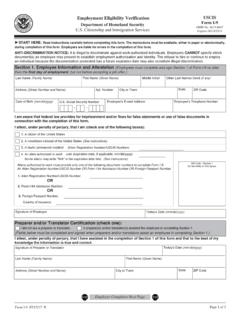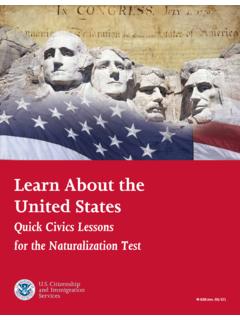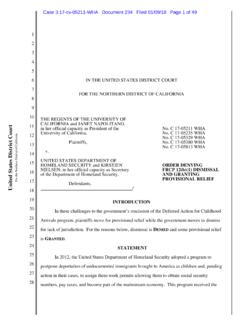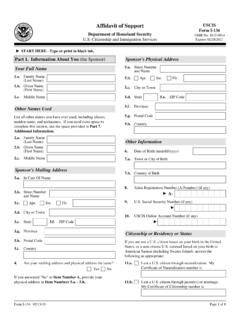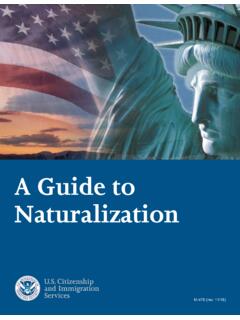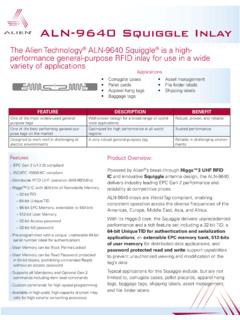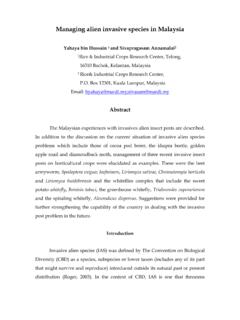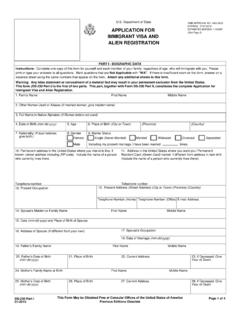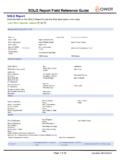Transcription of Form I-130/I-130A Instructions
1 Instructions for Form I-130, Petition for alien Relative, and Form I-130A, Supplemental Information for Spouse BeneficiaryDepartment of Homeland Citizenship and Immigration ServicesUSCIS Form I-130/I-130 AOMB No. 1615-0012 Expires 07/31/2018 Form I-130 Instructions 02/27/17 N Page 1 of 12 What Is the Purpose of Form I-130?A citizen or lawful permanent resident of the United States may file Form I-130, Petition for alien Relative, with Citizenship and Immigration Services (USCIS) to establish the existence of a relationship to certain alien relatives who wish to immigrate to the United States. Who May File Form I-130?1. If you are a citizen, you must file a separate Form I-130 for each eligible relative. You may file Form I-130 for:A. Your spouse;B.
2 Your unmarried children under 21 years of age;C. Your unmarried sons or daughters 21 years of age or older;D. Your married sons or daughters of any age;E. Your brothers or sisters (you must be 21 years of age or older); andF. Your mother or father (you must be 21 years of age or older).2. If you are a lawful permanent resident of the United States, you must file a separate Form I-130 for each eligible relative. You may file Form I-130 for:A. Your spouse;B. Your unmarried child under 21 years of age; andC. Your unmarried son or daughter 21 years of age or :1. If you are filing for your spouse, he or she must complete and sign Form I-130A, Supplemental Information for Spouse Beneficiary. If your spouse is overseas, Form I-130A must still be completed, but your spouse does not have to sign Form I-130A.
3 Form I-130A must be submitted with Form I-130. 2. There is no visa category for married children of lawful permanent residents. If you are a lawful permanent resident and you filed Form I-130 for your unmarried son or daughter, but your son or daughter marries before immigrating to the United States or adjusting status to lawful permanent resident, we will deny or automatically revoke your Non-citizen nationals (as defined in the Immigration and Nationality Act (INA) section 308) have the same rights as lawful permanent residents to petition for family members. If you are a national born in American Samoa or Swains Island (or who otherwise qualifies as a non-citizen national, as described in INA section 308), you should indicate in Part 2., Item Number 36.
4 Of the petition that you are a lawful permanent resident. You do not need to list an alien Registration Number (A-Number) in Part 2., Item Number 1. of the If the beneficiary qualifies under Items , , or above, you are not required to file separate petitions for the beneficiary s spouse or unmarried children under 21 years of age. They are considered derivative beneficiaries and you should list them in Part 4. of this I-130 Instructions 02/27/17 N Page 2 of 125. If you are the lawful permanent resident petitioner and the beneficiary qualifies under Items , , or above, you are not required to file separate petitions for the beneficiary s unmarried children under 21 years of age. They are considered derivative beneficiaries and you should list them in Part 4.
5 Of this The derivative beneficiaries described in Items 4. and 5. above may apply for an immigrant visa along with the May Not File Form I-130?You may NOT file Form I-130 for a person in the following categories:1. An adoptive parent or adopted child, if the adoption took place after the child turned 16 years of age, or if the child has not been in the legal custody and has not lived with the parents for at least 2 years before filing the petition;2. A natural parent, if you gained lawful permanent resident status or citizenship through adoption or as a special immigrant juvenile;3. A stepparent or stepchild, if the marriage that created the relationship took place after the child turned 18 years of age;4. A spouse, if you and your spouse were not both physically present at the marriage ceremony, unless the marriage was consummated;5.
6 A spouse, if you gained lawful permanent resident status through a prior marriage to a citizen or lawful permanent resident, unless:A. You are now a naturalized citizen;B. You have been a lawful permanent resident for at least five years;C. You can establish by clear and convincing evidence that you did not enter the prior marriage (through which you gained your lawful permanent resident status) in order to evade any immigration law; orD. Your prior marriage through which you gained your immigrant status was terminated by the death of your former spouse;6. A spouse, if you married your spouse while he or she was the subject of an exclusion, deportation, removal, or rescission proceeding regarding his or her right to be admitted into or to remain in the United States, or while a decision in any of these proceedings was before any court on judicial review.
7 However, you may be eligible for the bona fide marriage exemption under INA section 245(e)(3) if:A. You request in writing a bona fide marriage exemption and prove by clear and convincing evidence that the marriage is legally valid where it took place and that you and your spouse married in good faith and not for the purpose of obtaining lawful permanent resident status for your spouse and that no fee or any other consideration (other than appropriate attorney fees) was given to you for your filing of this petition. The request must be submitted with Form I-130; orB. Your spouse has lived outside the United States, after the marriage, for a period of at least two years;7. Any person, if USCIS determines that he or she entered into or attempted or conspired to enter into a marriage in order to evade immigration laws; and8.
8 A grandparent, grandchild, nephew, niece, uncle, aunt, cousin, or I-130 Instructions 02/27/17 N Page 3 of 12 General InstructionsUSCIS provides forms free of charge through the USCIS website. In order to view, print, or fill out our forms, you should use the latest version of Adobe Reader, which can be downloaded for free at If you do not have Internet access, you may call the USCIS National Customer Service Center at 1-800-375-5283 and ask that we mail a form to you. For TTY (deaf or hard of hearing) call: Each petition must be properly signed and filed. For all signatures on this petition, USCIS will not accept a stamped or typewritten name in place of a signature. A legal guardian may also sign for a mentally incompetent Fee. Each petition must be accompanied by the appropriate filing fee.
9 (See the What Is the Filing Fee section of these Instructions .)Biometric Services Fee. If you file this petition with USCIS, you do not need to include a biometric services fee at the time you submit your petition. If you are later notified that you must submit biometrics, you will receive a biometric services appointment notice with Instructions on how to submit the additional biometric services fee. If you file this petition with an agency other than USCIS, please check with that agency to determine if and when you must submit a biometric services At the time of filing, you must submit all evidence and supporting documentation listed in the General Requirements section of these Instructions . USCIS may issue a Notice of Intent to Deny (NOID) or a Denial Notice for petitions filed without the required supporting evidence.
10 Biometric Services Appointment. USCIS may require that you appear for an interview or provide fingerprints, photograph, and/or signature at any time to verify your identity, obtain additional information, and conduct background and security checks, including a check of criminal history records maintained by the Federal Bureau of Investigation (FBI), before making a decision on your application, petition, or request. After USCIS receives your petition and ensures it is complete, we will inform you in writing, if you need to attend a biometric services appointment. If an appointment is necessary, the notice will provide you the location of your local or designated USCIS Application Support Center (ASC) and the date and time of your appointment or, if you are currently overseas, instruct you to contact a Embassy, Consulate, or USCIS office outside the United States to set up an you are required to provide biometrics, at your appointment you must sign an oath reaffirming that:1.

